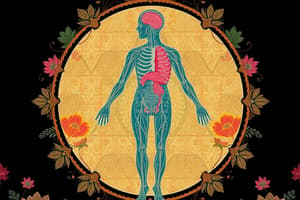Podcast
Questions and Answers
What is the primary reason for the development of specialized tissues for uptake of food and oxygen in multi-cellular organisms?
What is the primary reason for the development of specialized tissues for uptake of food and oxygen in multi-cellular organisms?
- The increase in body size of the organism
- The specialisation of body parts in performing different functions
- The complexity in body design of the organism
- The inability of all cells to be in direct contact with the environment (correct)
What is the primary function of the transportation system in multi-cellular organisms?
What is the primary function of the transportation system in multi-cellular organisms?
- To generate energy for the cells
- To facilitate the exchange of gases
- To transport food and oxygen to all parts of the body (correct)
- To remove waste products from the cells
Why do waste by-products of chemical reactions need to be removed from the body?
Why do waste by-products of chemical reactions need to be removed from the body?
- They are harmless to the cells
- They are necessary for the functioning of excretory tissues
- They are useful for energy generation
- They are useless for the cells and could be harmful (correct)
What is the function of excretory tissues in multi-cellular organisms?
What is the function of excretory tissues in multi-cellular organisms?
What is the consequence of the increase in body size and complexity in multi-cellular organisms?
What is the consequence of the increase in body size and complexity in multi-cellular organisms?
What is the primary purpose of nutrition in living organisms?
What is the primary purpose of nutrition in living organisms?
What is the primary source of energy for maintenance processes in living organisms?
What is the primary source of energy for maintenance processes in living organisms?
What is the role of oxidising-reducing reactions in the body?
What is the role of oxidising-reducing reactions in the body?
What is the primary function of respiration in living organisms?
What is the primary function of respiration in living organisms?
Why do organisms require additional raw material from outside to grow?
Why do organisms require additional raw material from outside to grow?
Flashcards are hidden until you start studying
Study Notes
Energy and Nutrition
- Energy is needed to prevent damage and breakdown in the body, and this energy comes from outside the body through food.
- Nutrition is the process of transferring energy from outside the body to the inside.
- Food sources are typically carbon-based molecules, and different organisms use different nutritional processes based on the complexity of these molecules.
Energy Sources and Breakdown
- The outside sources of energy are varied and need to be broken down or built up in the body.
- These energy sources are converted to a uniform source of energy that can be used for molecular movements and growth.
- Chemical reactions, including oxidising-reducing reactions, are necessary for breaking down molecules.
- Oxygen is often sourced from outside the body and used in the process of breaking down food sources for cellular needs.
Respiration
- Respiration is the process of acquiring oxygen from outside the body and using it to break down food sources for cellular needs.
- In single-celled organisms, no specific organs are needed for taking in food, exchanging gases, or removing wastes, as the entire surface of the organism is in contact with the environment.
Body Size and Complexity
- As body size increases and body design becomes more complex, simple diffusion is no longer sufficient to meet the needs of all cells.
- In multi-cellular organisms, specialized tissues develop to perform specific functions, including the uptake of food and oxygen.
- A transportation system is needed to carry food and oxygen from one place to another in the body.
Excretion
- Chemical reactions that use carbon sources and oxygen for energy generation create waste by-products that need to be removed from the body.
- Excretion is the process of removing these waste by-products from the body and discarding them outside.
- A specialized tissue for excretion develops in multi-cellular organisms, and the transportation system needs to transport waste away from cells to this excretory tissue.
Studying That Suits You
Use AI to generate personalized quizzes and flashcards to suit your learning preferences.




